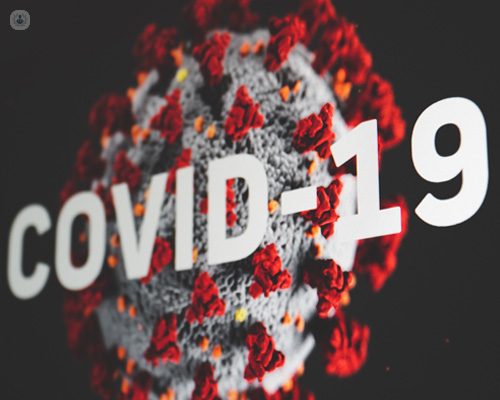Do COVID-19 and long COVID affect the bladder? Here's what you should know
Written by:Exactly to what extent can COVID-19 and long COVID affect one’s bladder? Find out in our latest article, as esteemed consultant gynaecologist and urogynaecologist, Professor Vik Khullar, provides us with a fascinating insight into the relationship between the virus and the bladder, outlining the main symptoms that patients have been reporting throughout the global pandemic.

What is currently known about COVID-19’s effect on the bladder? What symptoms have been reported?
In the initial stages of the pandemic, the main symptom appeared to be a painful bladder, but over time, we have seen more and more patients with urinary frequency, pain if they do not pass urine, or a desperate need to pass urine.
Another key element of what is now known as ‘COVID bladder’ is that patients will wake at night to pass urine. Patients who would only generally have one to two urine infections per year are now suddenly suffering from continuous and frequent infections.
COVID bladder has also resulted in patients arriving home with an intense urgency to pass urine, and they will often leak due to not being able to wait when unlocking their front door. Associated with that are long-COVID symptoms that generally include the following:
- intolerance to food
- fatigue
- swelling without any reason
- skin rashes
- worsening in diarrhoea and/or constipation
- dizziness when standing
- fast heartbeat
Interestingly, important data and research on this has shown that there are certainly abnormalities in white blood cells. These white blood cells seem to decline in people who have long COVID. We have looked at the bladder and we have found declining white cells living in the bladder.
So, the reason why there seems to be less of these white blood cells when we carry out blood tests is that they are going into the tissues, causing inflammation and making everything very irritated.
Another thing that people find quite distressing with COVID bladder is that they will often feel quite anxious. Studies have really shown that COVID bladder can actually affect all parts of the body. Interestingly, the vast majority of patients who have reported these COVID bladder-related symptoms have only suffered from a mild bout of COVID-19.
What is the connection between these symptoms and the COVID-19 virus?
The key thing about these symptoms is that, first of all, what has happened is that doctors who have been investigating have been doctors dealing with the lungs or blood pressure. It is only when we look at the areas which are affected, that, on one hand, there are lung-related symptoms such as difficulty breathing when walking up the stairs.
In terms of the heart, often people will have POTS. This means the person will feel very dizzy when standing, and their heart beats very fast to try and keep the blood pressure up. Both the lungs and heart are related to something called the autonomic nervous system, which is the part of the nervous system that gets involved when people have infections.
We have all experienced a cold before and thought to ourselves “I should be able to sit at my desk and work”, but people suffering from COVID bladder have said that they just feel so ill that they have got to go to bed. Now, the reason they have to go to bed is that their blood pressure is low, the pulse is high, and they have to, by lying down, correct the blood pressure, and as a result, they feel much better.
This is a very normal response to infection, and patients should not be concerned when the body causes these symptoms which affect the heart and the breathing. All of these symptoms are actually responses of the immune system to an infection. What is interesting about COVID-19, however, is that it makes one part of the immune system very angry.
This angry part of the immune system is typically also seen when someone gets a mosquito bite. Nothing much happens in terms of the bite itself, but 24 hours later we see swelling, redness, and pain. We see a similar thing in patients with long COVID, who report muscle pain. It is almost as if the body is experiencing a mosquito bite. People will also describe a feeling of being poisoned, but this is a normal feeling as the body is trying to fight off the virus, even if the virus may not be there anymore.
If a person has these symptoms, what should they do?
There are long COVID clinics where patients can be assessed. Patients will often have a low-grade bladder infection. The body has decided that the virus is in the body, the body has then produced inflammation, and this inflammation has then affected the inside of the bladder. We have now looked at over 60 patients with this, and we find that the inside of the bladder starts to bleed due to this inflammation.
When the wall of the bladder becomes inflamed, the lining becomes very fragile. We keep bacteria out primarily through the skin, so within the bladder, the lining keeps bacteria away. However, when inflammation occurs, that protective skin layer breaks down. As the lining of the bladder has become disrupted, bacteria start to live inside the bladder.
Interestingly, the bacteria that we are finding now inside patients’ bladder is very different to what we found before the outbreak of COVID-19. So, it is a completely different organism because the environment of the bladder has become very different.
Is the course of treatment the same as it would be without the patient also suffering from long COVID?
Treatment of a patient with COVID-19 is normally very acute, with the main aim being to reduce one’s temperature. Usually, patients would be assessed to see if they had a chest infection, and whether this chest infection was caused by bacteria or a left-over of the COVID-19 infection. Patients’ bowel will also be examined.
The long COVID symptoms, however, are present for 12 weeks after the initial infection, so this is something that has an entirely different aspect to it, when compared with acute, “standard” if you like, treatment.
We are not treating a virus or the effects of the virus acutely, but we are trying to calm the immune system that has become angry.
What is your advice for people suffering from long COVID?
The majority of patients that I have seen have had bladder problems, and that I happened to notice that they had other symptoms in the body. We have found that these symptoms really improve with treatment.
One of the crucial things is that vigorous exercise, or trying to beat long COVID does not work, and people end up a lot worse. Try to avoid intense levels of exercise when you are recovering. It is important to exclude other infections as well, such as chest infections and bowel infections. So, it is very important to get these infections under control as quickly as possible because if there is an infection in the body, the immune system is not going to stop, as its job is to protect us at all costs.
Professor Vik Khullar is a highly accomplished and experienced London-based gynaecologist and urogynaecologist. Consult with him today via his Top Doctors profile if you are concerned about any of the above-mentioned symptoms.


